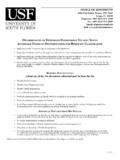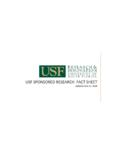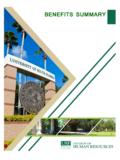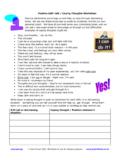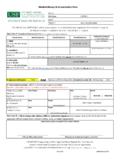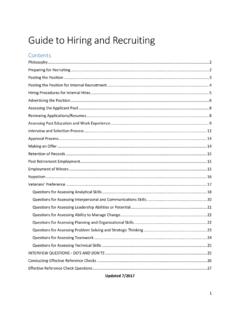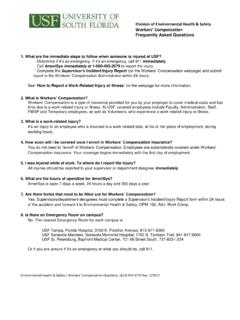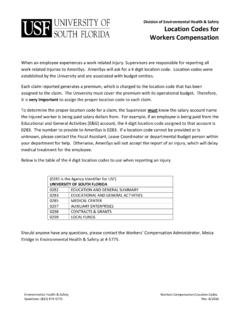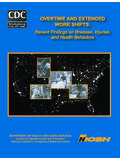Transcription of Policies and Procedures for Employees
1 Division of Human Resources / Attendance and Leave Return to Table of Contents Page | 1 Form questions: (813) 974-2970 Rev. 11/2018 T AB LE OF C ON T EN T S Hours of Work .. 3 Fair Labor Standards Act (FLSA) Provisions on Attendance & Leave .. 3 Work Hours .. 4 Non-Standard Workweek (Staff Employees only) .. 6 overtime , Compensatory Leave Hours and Work on a Holiday .. 6 Use, Transfer and Payment of Compensatory Leave (Staff Employees Only) .. 9 Calculating overtime Compensation .. 10 Participation on committees, task forces, and elected Bodies .. 10 USF Attendance Guidelines .. 11 Overview .. 12 Associated Documents .. 12 Procedures .. 12 Definitions .. 13 Holiday Pay .. 16 Holiday Hours / Pay .. 16 Observance of Religious Holy Days .. 16 Personal Holiday (Staff Employees Only) .. 17 Leave of Absences .. 17 Annual Leave.
2 17 Sick Leave .. 22 Administrative Leave .. 24 Compulsory Disability Leave .. 27 Domestic Violence Leave .. 29 Job Related Disability Leave .. 30 Active Military Duty 30 Division of Human Resources / Attendance and Leave Return to Table of Contents Page | 2 Form questions: (813) 974-2970 Rev. 11/2018 Medically Related Leave .. 36 Parental Leave .. 37 Faculty Paid Parental Leave .. 37 Faculty Paid Parental Leave Guidelines .. 39 Professional Development Leave .. 41 Leave Approval Considerations .. 42 Leave Payout .. 43 General Leave Payout Guidelines .. 43 Payment for Unused Annual Leave .. 44 Payment for Unused Sick Leave .. 45 Payment for Unused Special Compensatory Leave .. 45 Payment for Regular and overtime Compensatory Leave .. 46 Leave Payout Procedures .. 47 Special Cases .. 49 Additional Information .. 50 Security of employee Medical Information.
3 50 Nursing Mother Guidelines .. 52 Emergency Closing FAQs .. 52 Faculty Paid Parental Leave FAQs .. 54 Division of Human Resources / Attendance and Leave Return to Table of Contents Page | 3 Form questions: (813) 974-2970 Rev. 11/2018 HOURS OF WORK FAIR L ABOR STAND ARD S ACT (FL S A) P ROVISIONS ON ATTE ND ANCE & LEAVE The FLSA governs, but is not limited to setting a minimum hourly wage, establishing a minimum age to work, identifying compensable hours, and defining overtime and overtime compensation. These apply to USF. There are a number of sites on the web that provide information about the FLSA. Some of those are listed at the end of this section. This section of the USF Division of Human Resources (DHR) Procedures covers hours of work and pertains to non-exempt Staff and Temporary Employees .
4 For non-exempt Staff Employees , when the total hours worked exceed 40 in a workweek, those Employees are eligible for compensation in the form of compensatory time or overtime pay. Temporary Employees are not eligible for compensatory time but are eligible for overtime pay when their actual work hours exceed 40 in a workweek. At times, there are misunderstandings about what the FLSA does or does not require. As a summary, the FLSA does not require: vacation, holiday, severance, or sick pay; meal or rest periods, holidays off, or vacations; premium pay for weekend or holiday work; pay raises or fringe benefits; and a discharge notice, reason for discharge, or immediate payment of final wages to terminated Employees . When we think of work, we normally think of being engaged in some type of activity that as an end result accomplishes something, completes a task, etc. The activity or principal activity referred to by the FLSA may be physical, mental and/or both.
5 We often times think only of the activities involved with the execution of the specific duties and responsibilities and work hours that have been outlined on our job descriptions as work time. However, there are some activities that may be counted as compensable hours worked for non-exempt Employees outside of the normal duties and responsibilities. Some of those situations and examples are: Breaks and Meal Period - The FLSA does not require an employer to provide time for breaks and meal periods. Breaks - It is important to remember that breaks are not mandatory. It is a privilege, not a right. At the university, non-exempt Staff and Temporary Employees may be permitted one 15 minute mid-morning break and one 15 minute mid-afternoon break. Breaks cannot be accumulated, cover for late arrival to work, extended lunch hours, or be used for early departure from work. The time spent on authorized breaks must be counted as hours worked.
6 Any exceptions to the above must be approved through DHR. Meal Periods - Even though the FLSA does not require employers to provide meal periods, it does stipulate that if one does exist, at least 30 minutes or more constitute a bona fide meal period. Meal periods are not counted as work time. Normally, Employees remove themselves from the work location and are therefore not performing any duties. However, when an employee remains at the work location and while eating performs any job-related duties, other than incidental ones (such as answering a question), the time must be counted as hours Division of Human Resources / Attendance and Leave Return to Table of Contents Page | 4 Form questions: (813) 974-2970 Rev. 11/2018 worked. At USF, a supervisor may adjust an employee 's work schedule to prevent an overtime situation when an employee works during a meal period.
7 Suffered or Permitted Work Hours - Although there are some standard times or peak periods when overtime might be required, normally the need to work overtime is for emergency situations only. overtime must be requested and approved prior to working the additional hours. Work not requested but suffered or permitted is still considered hours worked. This may occur when an employee begins to work prior to the beginning of the assigned shift, during the lunch hours, or continues to work at the end of the assigned shift without approval. When the supervisor has knowledge of or has reason to believe that the employee is working additional hours that have not been requested and approved, the hours must be counted as hours worked. Travel - Official Travel during an employee 's normal working hours, whether on regular workdays or regular days off, shall be counted as hours worked.
8 Time spent traveling outside of the employee 's normal working hours is not considered work time as defined by the FLSA. Please consult the USF Attendance and Leave Administrator in DHR if there are any questions about which hours must be counted as work time during travel. Waiting to Work - An employee who has been working required overtime (notification from the supervisor had been on a day-to-day basis) is in a compensable waiting period if at the end of their regular scheduled shift, he/she has not been notified if overtime is required for that day and he/she must "wait" for that determination. Even though he/she is not performing any duties, he/she doesn't know if overtime will be required for that day and has not been released to go home. The waiting time is considered hours of work and those hours are compensable and reported as work hours on the time sheet for that day. Medical Attention Time spent by an employee waiting for and receiving medical attention for a work-related injury or illness during the employee s normal scheduled shift constitutes hours worked.
9 Therefore, such time is compensable as hours worked for overtime purposes. WORK HOURS Regular Hours of Operation the University s regular hours of operation are 8:00 to 5:00 , Monday through Friday. Generally, university offices and units are to be sufficiently staffed to provide full services during the hours of operation, except when the university is closed. Because certain university services are available to clients outside the regular hours of operation, this schedule may vary depending on the nature of the job and when services must be provided. For example, some offices are open earlier or later one or more days per week. Others may have assigned shifts or rotating shifts where the normal work schedule is other than 8:00 to 5:00 Workweek - For full-time Staff and Temporary Employees , 40 hours constitutes a workweek. Friday through Thursday is the workweek and corresponds to our bi-weekly pay period schedule.
10 Administration and Faculty are expected to work the hours necessary to carry out assignments, and their work hours may exceed 40 in a workweek. Under certain Division of Human Resources / Attendance and Leave Return to Table of Contents Page | 5 Form questions: (813) 974-2970 Rev. 11/2018 conditions, a supervisor may approve a non-standard workweek. Temporary Hours Hourly Temporary Employees receive payment for actual hours worked and are not eligible for any paid holidays. Salaried Temporary Employees (adjunct, professional, post docs, phased retirees, and graduate assistants/associates) are paid a bi-weekly amount to complete a project or assignment and may be paid if so certified. Timesheets - The University requires all non-exempt Employees (with the exception of salaried temporary Employees ) to fill out a timesheet each day they work.
